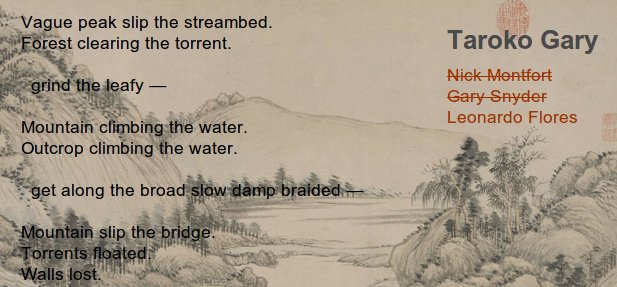Call for Proposals…
June 20-23, 2012
Morgantown, WV
Conference Planning Committee
– Sandy Baldwin, West Virginia University (Chair)
– Philippe Bootz, University of Paris 8
– Dene Grigar, Washington State University Vancouver
– Margie Luesebrink, Irvine Valley College
– Mark Marino, University of Southern California
– Stuart Moulthrop, University of Wisconsin, Milwaukee
– Joseph Tabbi, University of Illinois, Chicago
We invite titles and proposals of no more than 500 words, including a brief description of the content and format of the presentation, and contact information for the presenter(s). Send proposals to elit2012 [at] gmail.com, using plain text format in the email, or attached as Word or PDF. All proposals will receive peer-to-peer review by the ELO and will be considered on their own terms. Non-traditional and traditional formats will be subject to the same peer-to-peer review process.
Submission deadline for proposals: November 30, 2011
Notification of acceptance: December 30, 2011
Electronic Literature: Where is It?*
The 2012 Electronic Literature Organization Conference will be held June 20-23, 2012 in Morgantown, WV, the site of West Virginia University. In conjunction with the three-day conference, there will be a juried Media Arts Show open to the public at the Monongalia Arts Center in Morgantown and running from June 18-30, 2012. An accompanying online exhibit will bring works from the ELO Conference to a wider audience.
Even if nobody could define print literature, everyone knew where to look for it – in libraries and bookshops, at readings, in class, or on the Masterpiece channel. We have not yet created, however, a consensus about where to find electronic literature, or (for that matter) the location of the literary in an emerging digital aesthetic.
Though we do have, in digital media, works that identify themselves as “locative,” we don’t really know where to look for e-lit, how it should be tagged and distributed, and whether or how it should be taught. Is born digital writing likely to reside, for example, in conventional literature programs? in Rhetoric? Comp? Creative Writing? Can new media literature be remediated? How should its conditions of creation be described? Do those descriptions become our primary texts when the works themselves become unavailable through technological obsolescence?
To forward our thinking about the institutional and technological location of current literary writing, The Electronic Literature Organization and West Virginia University’s Center for Literary Computing invite submissions to the ELO 2012 Conference to be held from June 20-23, 2012, in Morgantown, West Virginia.
Bearing in mind the changing locations of new media literature and literary cultures, the conference organizers welcome unconventional presentations, whether in print or digital media. The point is not to reject the conventional conference ‘paper’ or bullet point presentation but to encourage thoughtful exploration and justification of any format employed. All elements of literary description and presentation are up for reconsideration. The modest mechanisms of course descriptions, syllabus construction, genre identification, and the composition of author bios, could well offer maps toward the location of the literary in digital media. So can an annotated bibliography of works falling under a given genre or within a certain technological context. We welcome surveys of the use of tags and keywords, and how these can be recognized (or not) by readers, libraries, or other necessary nodes in an emerging literary network Also of interest is the current proliferation of directories of electronic literature in multiple media, languages, and geographical locations.
The cost of the conference is $150; graduate students and non-affiliated artists pay only $100. The cost covers receptions, meals, and other conference events. All participants must be members of the Electronic Literature Organization. All events are within walking distance of the conference hotels. Morgantown is a classic college town, located in the scenic hills of north central West Virginia, about 70 miles south of Pittsburgh, PA. Local hotel and travel information will be available on the conference website starting October 1, 2011.
Check http://el.eliterature.org and http://conference.eliterature.org for updates. For more information, email elit2012 [at] gmail.com.
*Note: this title derives from an essay by ELO Board Member Dene Grigar in electronic book review, where selected conference presentations will be published within a few months of the conference.










